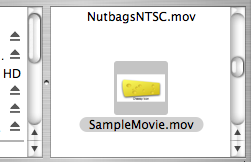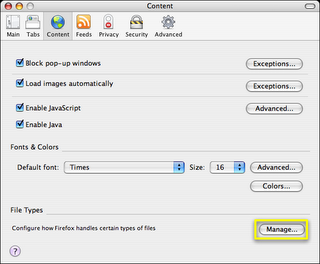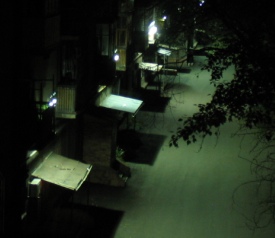It's fun to track permutations of British actors through stage and screen. The casts of the "Harry Potter" series, "Gosford Park", "Love, Actually", "Tristram Shandy", and so on, are all interwoven. And now another pair for the mix: Stephen Fry and Hugh Laurie.
A few months ago Bobi and I watched "Tristram Shandy: A Cock and Bull Story". It was funny, non-linear, convoluted, recursive in a way that not many movies are. Shades of Douglas Adams.
Stephen Fry appeared in the film in a small role, that of Parson Yorick. He had a much more prominent role in the Special Features section of the DVD, wherein he visited the house in which Laurence Sterne wrote the book on which the movie was based, and discussed the author's life and bizarre afterlife with (I think) the caretaker of the house.
Wikipedia summarizes Sterne's unquiet quietus:
...Sterne's body was stolen shortly after it was interred and sold to the anatomists. [I thought they said "resurrectionists" in the DVD, but never mind.] It was recognised by somebody who knew him and discreetly reinterred. When the churchyard of St. George's was redeveloped in the 1960s, his skull was disinterred (in a manner befitting somebody who chose for himself the nickname of "Yorick"), partly identified by the fact that it was the only skull of the five in Sterne's grave that bore evidence of having been anatomised, and transferred to Coxwold Churchyard in 1969. The story of the reinterment of Sterne's skull in Coxwold is alluded to in Malcolm Bradbury's novel To The Hermitage.
Fry played Parson Yorick in the film. Sterne used the nickname "Yorick". Fry and host discuss this during the tour, linking the nickname to Sterne's humorous taunting of death, which swirled around him as he wrote the book. They note the irony that, in 1969, only the skull and femurs were retrieved: these constituents of the Jolly Roger were believed by some (the
Knights Templar?) to be the minimum set of earthly remains necessary for resurrection.
But that's not what this post is about.
Stephen Fry looked familiar. IMDB showed that he'd done the Black Adder series, so maybe that's where I'd seen him before. He was also credited as the narrator of the British audiotape recordings of the Harry Potter series. So Fry extends the permutations of British actors beyond stage and screen to audio books.
I checked Netflix to see if he'd made any other movies that I recognized. No joy. But Netflix did carry a television sketch-comedy series,
"A Bit of Fry and Laurie", from the late 1980s, featuring Stephen Fry and
Hugh Laurie.
I've just rented it. It wasn't great. Most of the sketches consisted of two Britishmen standing or sitting, having long-winded conversations. They were almost, but not quite, as dull as this post.
Some bits did make me laugh out loud. For example Hugh Laurie's piano ballad, "Mystery," proved that a seated, long-winded monologue can be hilarious when accompanied by music.
My favorite sketch was introduced by Stephen Fry, playing the host for a public access education series. What would you call it, "University TV" or something like that. But, rather than introducing a segment on Elementary Bookkeeping, Mr. Fry pleasantly announced that he was presenting bloopers culled from the education series archives.
Yep, a blooper reel from public access television. From the early 1970s. Flash to Hugh Laurie in polyester and shaggy hair, screwing up a chalkboard presentation on the path traced by a point on a rolling wheel.
But that's not what this post is about.
Hugh Laurie looked familiar. IMDB showed that he'd done the Black Adder series...
Finally I recognized him from
"House", a television drama. Laurie plays the gruff lead character, who speaks in a low, gravelly, American-accented voice. Not at all funny. Not at all British. Now that's a bit different.
What the hell
is this post about?















